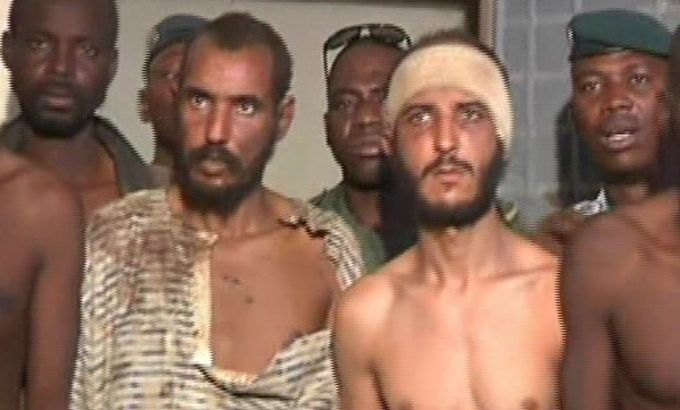Brussels conference focuses on Mali roadmap
Regional powers and representatives from world bodies discuss stabilisation and reconstruction after defeat of rebels.

Delegations from the African Union, United Nations, European Union and the West African regional body ECOWAS, among others, have been meeting in Brussels to discuss Mali’s future.
The rapid progress of French-led military forces against al-Qaeda-linked rebels in the country’s north has now put diplomatic focus on how to ensure lasting peace in the country.
Tuesday’s talks focused on giving delegates an update on the military situation and humanitarian affairs, Al Jazeera’s Paul Brennan reported from Brussels.
The delegates also discussed the political process following the conflict, and arrangements for holding elections by July 31 as planned.
More than 40 delegations are attending the meeting, which is being hosted by the EU.
“The priority that they’re putting forward is that elections are held as soon as possible,” Al Jazeera’s Jacky Rowland reported from Bamako, the Malian capital.
The conference is focusing on rebuilding Mali’s economy and creating structures that allow for all Malians to be represented in government.
In France, President Francois Hollande, whose decision to intervene in Mali won him a hero’s welcome there during a whirlwind tour on Saturday, defended the decision to send troops in his first address to the European parliament
since taking office.
“There was no time to lose,” he said, otherwise “terrorism would have conquered all of Mali”.
Fighters arrested
On the ground, in northern Mali, French soldiers are now in control of Kidal, formerly the last stronghold of the rebel Ansar al-Dine.
The French push in the northeast involved fighter jets targeted rebel hideouts and fuel depots in the desert on Tuesday, near the Algerian border.
The French defence ministry said 1,800 Chadian troops had entered Kidal to “secure” the Saharan outpost, after days of air strikes in the surrounding mountains where rebels were believed to be hiding in hillside caves.
Also on Tuesday, eight al-Qaeda-linked suspects were captured in Gao, and are expected to be transferred to Bamako where they will eventually stand trial. They include six Malians, a Nigerian and an Algerian man.
After a three-week military campaign by French-led forces drove the rebels from most of their strongholds, including the cities of Timbuktu and Gao, dozens of French warplanes on Sunday carried out major air strikes on rebel training and logistics centres in Mali’s mountainous northeast, near the Algerian border.
“It is about destroying their rear bases, their depots,” Laurent Fabius, the French foreign minister, told France Inter radio.
The al-Qaeda-linked rebels who controlled northern Mali for 10 months have fled into the Adrar des Ifoghas massif in the Kidal region, a mountainous landscape honeycombed with caves.
They are believed to be holding seven French hostages with them, kidnapped in Mali and Niger in 2011 and 2012.
Algeria on Monday also beefed up its positions on the Malian border to prevent “the infiltration of terrorist groups”, Mohamed Baba Ali, a member of parliament from the southern town of Tamanrasset, told the AFP news agency.
French withdrawal
France says it is eager to hand over security in Mali to about 8,000 African troops, gradually deploying to the country under a UN-backed plan.
During his Mali visit, Hollande said while France had plans to pull out from the country, French troops would not leave until it had driven out all the al-Qaeda-linked armed groups.
For his part, Fabius said: “We want to be rapidly relieved by the AFISMA African forces in the cities that we hold.”
 |
|
During Tuesday’s meeting in Brussels, European officials will try to find ways to reinforce military gains [AFP] |
In Paris, US Vice President Joe Biden, after meeting Hollande, said the UN should make the African mission a formal UN peacekeeping operation, a plan UN officials say they are pushing forward.
The EU thinks it can help quickly by releasing some of the 250m euros ($342m) of development aid it froze after a coup in Mali in March last year.
“When a state falls apart, it takes a while to put it back together again … Nevertheless, we need to try,” a senior EU official said, speaking on condition of anonymity.
The country is also experiencing a crippling food crisis which has put an estimated 18 million people at risk of starvation across the Sahel.
The UN said on Tuesday it had also resumed food aid operations in northern Mali, which were frozen after a French-led offensive began.
“The World Food Programme has relaunched its distribution of food and nutritional supplements in the north of Mali,” Elisabeth Byrs, the UN food agency’s spokeswoman, said in Geneva.
The International Red Cross said despite the retreat of the rebels, residents who had fled fighting, estimated by the UN at over 350,000, were also hesitant to return home, with only 7,000 in central Mali returning so far.